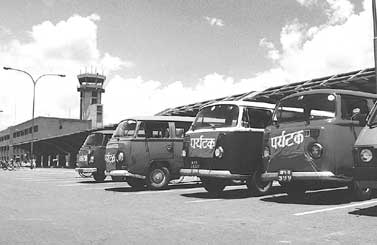 The tourism business people must have been happy to see the action on Nepali New Year's eve. Almost all hotels and restaurants had something happening that day. When foreign tourists dry up, one realises that one has been ignoring the potential of a more local clientele. But do last week's New Year celebrations and all the greetings calling for peace that were sent out and received in the capital really change the future scenario?
The tourism business people must have been happy to see the action on Nepali New Year's eve. Almost all hotels and restaurants had something happening that day. When foreign tourists dry up, one realises that one has been ignoring the potential of a more local clientele. But do last week's New Year celebrations and all the greetings calling for peace that were sent out and received in the capital really change the future scenario? The five-day bandh in early April paralysed most of the nation. Government may claim that the SLC examinations went on fine, but business and commerce took a beating that will be felt for some time. Even worse, those five days show that the government may not be in a position to prevent any further bandhs in the future.
Bandhs in South Asia have emerged as a strong tool of protest, propagated and preached by no less than Gandhi himself, as well as other leaders during India's movement for freedom. By now it has assumed monolithic proportions which few governments can counter successfully. The limited security forces cannot anticipate or counter the moves made by the party calling the bandh. The first effect is on transportation-no vehicle wants to be on the roads at the risk of being pelted with stones. So, of course, no one commutes anywhere. Which in turn means shops remain closed, because shopkeepers can't make it to work, and because the drastically reduced movement of people always means a concomitant decrease in business. Neighbourhood shops that supply milk, vegetables and eggs could potentially stay open, but then how do they get their supplies?
And so photographs-and just the sight-of rows of closed shops become the most important way to gauge the success or failure of a bandh. The ruling government, if it is not sponsoring the bandh, tries to ensure that shutters stay up, so even if the bandh has, more or less, an impact, it does not appear so bad.
In Nepal as in other South Asian countries, all parties that have come to power, or even remained in opposition, have used this tool effectively and institutionalised it with the necessary ingredients of violence, coercion and fear. This is why even a bandh called by an otherwise obscure association or group of people is scary, an unknown quantity, and so vehicles remain off the roads, shutters are down and all institutions are closed.
Many keen observers of our glorious way of life insist that bandhs are so successful in Nepal because they fit in perfectly with a core characteristic of the Nepali psyche-evading work. Although methinks this is an overly cynical, possibly even defeatist position to take, it is true that bandhs are often openly discussed in terms of being a windfall break, especially for people in government, when one signs the attendance register, to be sure, but follows that by simply sitting back for a fun-filled day with exciting card games, endless cups of tea, naps and a few discreet moments of personal grooming. On a bandh, even government servants-what an ironic description-at the highest level make no attempt to either work themselves or make sure that others do too.
The Beed's intention is not to lay the blame squarely and in somewhat simplistic fashion on politicians alone. And yet they do quite urgently need to recognise just how bad times are for the business community. Politicians of all hues who in normal times stick to the business community like especially stubborn stains, have now disappeared. They have no interest in the problems of business and industry. But what they do not realise is if they condemn business to run as best as it can in such an uncongenial environment, there will not be very much left for them to squabble over in the end, and then we will all be left with the same thing-a sort of permanent bandh. And that only means two things-we'll all be poorer and we'll all be a lot more discontented. Now that's a scary thought.
Readers can post their views at [email protected]



